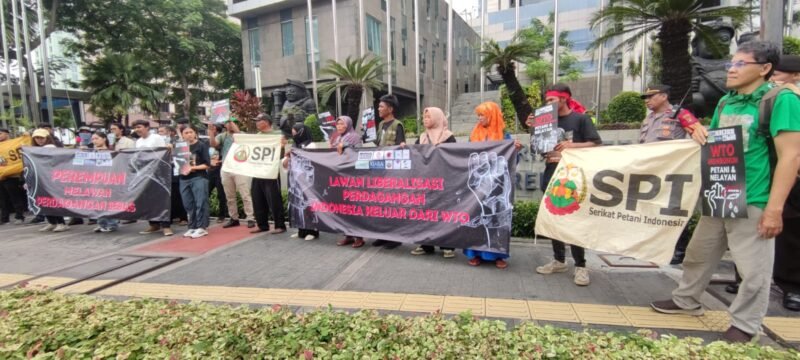In Jakarta, on Tuesday, February 27, 2024, the Indonesian Peasants Union (SPI), alongside the Civil Society Coalition for Economic Justice, held a demonstration outside the Ministry of Trade of the Republic of Indonesia. This protest was a response to the 13th WTO Ministerial Conference convened in Abu Dhabi, United Arab Emirates, from February 26-29, 2024. The primary objective of the protest was to voice opposition to trade liberalization and advocate for Indonesia’s withdrawal from the WTO, emphasizing its detrimental effects on small-scale farmers in the country.
Since its establishment, the WTO has aimed to regulate international trade based on the principles outlined in the General Agreement on Tariffs and Trade (GATT). GATT’s fundamental principle is trade liberalization, advocating for the elimination of all trade barriers to facilitate “fair” trade. Consequently, countries are prohibited from imposing tariffs or non-tariff measures to shield their economies, thereby placing small farmers who produce essential food items at a disadvantage as they are compelled to compete with well-funded corporations.
The importation of food has proven to be particularly harmful to small-scale food producers in Indonesia. For instance, the importation of 3 million tons of rice in 2024 led to a decrease in rice prices at the local farmer level across various regions. This policy is aligned with WTO principles, prioritizing free trade without considering the welfare of domestic producers. Indonesia has faced WTO interventions on multiple occasions, such as in 2021 regarding chicken meat imports and in 2017 concerning horticulture and animal product imports. These interventions have also influenced the Omnibus Law on Job Creation, further enabling trade liberalization.
Given these concerns, SPI continues to call on the government to exclude agriculture from WTO discussions. Furthermore, WTO free trade policies do not align with the UN Declaration on the Rights of Peasants and Other People Working in Rural Areas (UNDROP). Despite Indonesia and the G33 countries consistently advocating for exemptions such as Public Stock Holding (PSH) and Special and Differential Treatment (S&DT) in WTO negotiations, these efforts have been rebuffed by developed countries and are viewed as violating WTO principles. Therefore, in addition to advocating for withdrawal from the WTO, SPI stresses the importance of the government committing to achieving food sovereignty—a concept ensuring access to nutritionally adequate and culturally appropriate food produced through sustainable and environmentally friendly agricultural practices.

